NURSING MISC
Marshalltown Community College
All 45 results
Sort by
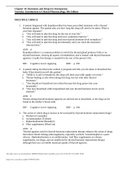
-
Chapter 16: Hormones and Drugs for Osteoporosis Visovsky: Introduction to Clinical Pharmacology, 9th Edition
- Exam (elaborations) • 9 pages • 2023
-
- $9.99
- + learn more
MULTIPLE CHOICE 1. A patient diagnosed with hypothyroidism has been prescribed treatment with a thyroid hormone agonist. The patient asks you how long this drug will need to be taken. What is your best response? a. “You will need to take this drug for the rest of your life.” b. “You will need to take this drug until your symptoms improve.” c. “You will need to take this drug until your thyroid hormone level normalizes.” d. “You will need to take this drug incrementally until...
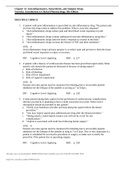
-
Chapter 12: Anti-inflammatory, Antiarthritis, and Antigout Drugs Visovsky: Introduction to Clinical Pharmacology, 9th Edition
- Exam (elaborations) • 9 pages • 2023
-
- $9.49
- + learn more
MULTIPLE CHOICE 1. A patient with joint inflammation is prescribed an anti-inflammatory drug. The patient asks you how this drug works to address this problem. What is your best response? a. “Anti-inflammatory drugs reduce pain and limit blood vessel responses to joint injury.” b. “Anti-inflammatory drugs contain antibacterial and anti-inflammatory properties.” c. “Anti-inflammatory drugs limit the body’s response to cortisol in the body.” d. “Anti-inflammatory drugs incre...
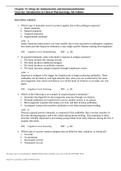
-
Chapter 15: Drugs for Immunization and Immunomodulation Visovsky: Introduction to Clinical Pharmacology, 9th Edition
- Exam (elaborations) • 6 pages • 2023
-
- $9.49
- + learn more
MULTIPLE CHOICE 1. Which type of immunity serves to protect against day-to-day pathogen exposure? a. Innate immunity b. Natural immunity c. Acquired immunity d. Supplemental immunity ANS: A Innate immunity helps protect you from smaller day-to-day exposures to pathogenic organism but cannot provide long-term immunity to any single specific disease-causing microorganism. DIF: Cognitive Level: Remembering REF: p. 280 2. In acquired immunity, what is the body’s response to antigen expos...
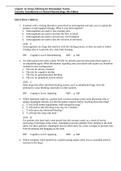
-
Chapter 14: Drugs Affecting the Hematologic System Visovsky: Introduction to Clinical Pharmacology, 9th Edition
- Exam (elaborations) • 10 pages • 2023
-
- $9.99
- + learn more
MULTIPLE CHOICE 1. A patient with a clotting disorder is prescribed an anticoagulant and asks you to explain the purpose of anticoagulant therapy. What is your best response? a. Anticoagulants are used to lyse existing clots. b. Anticoagulants are used to increase the flow of blood. c. Anticoagulants are used to prevent new clot formation. d. Anticoagulants are used to thin the viscosity of the blood. ANS: C Anticoagulants are drugs that interfere with the clotting process, so they are u...
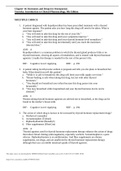
-
Chapter 16: Hormones and Drugs for Osteoporosis Visovsky: Introduction to Clinical Pharmacology, 9th Edition
- Exam (elaborations) • 9 pages • 2023
-
- $8.49
- + learn more
MULTIPLE CHOICE 1. A patient diagnosed with hypothyroidism has been prescribed treatment with a thyroid hormone agonist. The patient asks you how long this drug will need to be taken. What is your best response? a. “You will need to take this drug for the rest of your life.” b. “You will need to take this drug until your symptoms improve.” c. “You will need to take this drug until your thyroid hormone level normalizes.” d. “You will need to take this drug incrementally until...
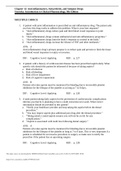
-
Chapter 12: Anti-inflammatory, Antiarthritis, and Antigout Drugs Visovsky: Introduction to Clinical Pharmacology, 9th Edition
- Exam (elaborations) • 9 pages • 2023
-
- $8.49
- + learn more
MULTIPLE CHOICE 1. A patient with joint inflammation is prescribed an anti-inflammatory drug. The patient asks you how this drug works to address this problem. What is your best response? a. “Anti-inflammatory drugs reduce pain and limit blood vessel responses to joint injury.” b. “Anti-inflammatory drugs contain antibacterial and anti-inflammatory properties.” c. “Anti-inflammatory drugs limit the body’s response to cortisol in the body.” d. “Anti-inflammatory drugs incre...
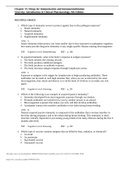
-
Chapter 15: Drugs for Immunization and Immunomodulation Visovsky: Introduction to Clinical Pharmacology, 9th Edition
- Exam (elaborations) • 6 pages • 2023
-
- $7.99
- + learn more
MULTIPLE CHOICE 1. Which type of immunity serves to protect against day-to-day pathogen exposure? a. Innate immunity b. Natural immunity c. Acquired immunity d. Supplemental immunity ANS: A Innate immunity helps protect you from smaller day-to-day exposures to pathogenic organism but cannot provide long-term immunity to any single specific disease-causing microorganism. DIF: Cognitive Level: Remembering REF: p. 280 2. In acquired immunity, what is the body’s response to antigen expos...
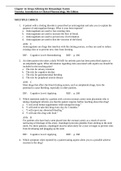
-
Chapter 14: Drugs Affecting the Hematologic System Visovsky: Introduction to Clinical Pharmacology, 9th Edition
- Exam (elaborations) • 10 pages • 2023
-
- $8.99
- + learn more
MULTIPLE CHOICE 1. A patient with a clotting disorder is prescribed an anticoagulant and asks you to explain the purpose of anticoagulant therapy. What is your best response? a. Anticoagulants are used to lyse existing clots. b. Anticoagulants are used to increase the flow of blood. c. Anticoagulants are used to prevent new clot formation. d. Anticoagulants are used to thin the viscosity of the blood. ANS: C Anticoagulants are drugs that interfere with the clotting process, so they are u...
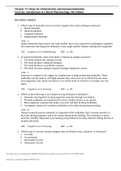
-
Chapter 15: Drugs for Immunization and Immunomodulation Vislosky: Introduction to Clinical Pharmacology, 9th Edition
- Exam (elaborations) • 6 pages • 2023
-
- $8.49
- + learn more
Chapter 15: Drugs for Immunization and Immunomodulation Vislosky: Introduction to Clinical Pharmacology, 9th Edition MULTIPLE CHOICE 1. Which type of immunity serves to protect against day-to-day pathogen exposure? a. Innate immunity b. Natural immunity c. Acquired immunity d. Supplemental immunity ANS: A Innate immunity helps protect you from smaller day-to-day exposures to pathogenic organism but cannot provide long-term immunity to any single specific disease-causing microorganism. ...
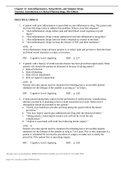
-
Chapter 12: Anti-inflammatory, Antiarthritis, and Antigout Drugs Visovsky: Introduction to Clinical Pharmacology, 9th Edition
- Exam (elaborations) • 9 pages • 2023
-
- $8.99
- + learn more
Chapter 12: Anti-inflammatory, Antiarthritis, and Antigout Drugs Visovsky: Introduction to Clinical Pharmacology, 9th Edition MULTIPLE CHOICE 1. A patient with joint inflammation is prescribed an anti-inflammatory drug. The patient asks you how this drug works to address this problem. What is your best response? a. “Anti-inflammatory drugs reduce pain and limit blood vessel responses to joint injury.” b. “Anti-inflammatory drugs contain antibacterial and anti-inflammatory properties...

That summary you just bought made someone very happy. Also get paid weekly? Sell your study resources on Stuvia! Discover all about earning on Stuvia


